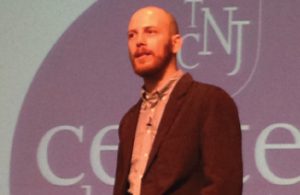Jonathan M. Katz, the only full-time American journalist to cover the events surrounding the 2010 earthquake in Haiti, spoke to students about the flaws of international intervention and the island’s slow recovery on Wednesday, Oct. 2.
Katz, who penned the disaster relief efforts into a book called “The Big Truck That Went By,” was a reporter for the Associated Press at the time of the earthquake. From the crumbling second story of a rented house in Pétionville, he began reporting on the destruction unfolding around him, including the boondoggle of the United Nations’ efforts to provide aid, and broke the story of an unprecedented cholera outbreak stemming from U.N. activity.
With these overt concerns in mind, Katz stressed that rushing to aid a nation in distress might not be the most effective measure.

“Sometimes it’s better to be thoughtful than to be helpful,” he said. “And it’s more important for the person helping to step back and think through exactly what they’re doing.”
Immediately stressing the point is the subtitle of his book: “How the World Came to Save Haiti and Left Behind a Disaster.” There are innate flaws within an atmosphere where uninformed parties run amok in situations more complicated than originally understood.
“You see a problem somewhere in the world, and you think that by spontaneously acting, you can solve the problem,” Katz said. “Our inherent notion of social justice, or just being helpful, is very much intimately tied up with our privileges … so we don’t stop to think what the actual repercussions of those actions might actually be.”
The heralds of good will, though well-intentioned, weren’t aware of other underlying problems that may not have been visible. Many of these were infrastructure oriented — improved sewer and sanitation systems, for instance, were desperately needed. But the logistics of this are complex and overlooked.
When it came time to find solutions regarding water, septic and sanitation systems, no foreign aid in Haiti was prepared to tackle the question.
“These are problems that have been solved for over a century in developed areas of the world with good governance and infrastructure, but the solutions are really difficult,” Katz said. “It requires boring work, long term investment … and many times without a statue in your name. But the work that you do may very well save the lives of millions of people.”
Katz’s coverage of Haiti has been praised for its accuracy and cogent analysis of how disaster relief turned into a bona fide disaster. In taking on the mistakes of the U.N., though, he faced a gap between his own preponderance of evidence and the organization’s denial of the facts.
“You never know how a story is going to be received, and you shouldn’t withhold a story solely because the people being implicated might be angry,” Katz said in an interview with The Signal. “At this point, the U.N. has stopped being in the business of denying their connections to the cholera outbreak and simply don’t want to talk about it. So the debate has shifted to ‘what should be done about it,’ and there’s a strong argument to be made on the merits of accountability.’
But as a journalist working in the field, he cited his preparedness and research as nothing short of essential in crafting a faithful story.
“Almost by luck, I had been in Haiti for about two and a half years by then,” Katz said. “I really knew the place and I really knew the situation … so the thing to do is prepare, both in terms of your training and your safety in responding to a dangerous situation, so that when something does happen, you find yourself in the right place at the right time.”






